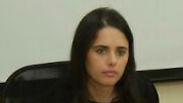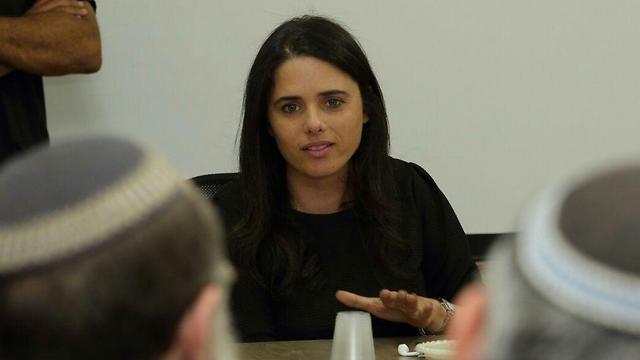Following the demolition of the houses in the West Bank settlement of Beit El, Justice Minister Ayelet Shaked called to transfer hearings on land disputes in the West Bank to another tribunal other than the High Court of Justice.
Shaked told Yedioth Ahronoth that "the root of the problem is the fact that all the rulings regarding land disputes in the West Bank are handed down by the High Court and not regular courts." Wednesday, MK Moti Yogev (Bayit Yehudi), said that "a Caterpillar D- 9's bulldozer blade should be raised against the High Court".
"The whole system is distorted," Shaked said after the demolition of the houses at Beit El, and before the evacuation of settlers barricaded in the former West Bank settlement of Sa-Nur, completed at 7am Thursday.
She added that two lawyers are using the High Court to implement a far-left agenda, referring to Michael Sfard and Shlomi Zecharia, lawyers for Yesh Din, an Israeli human rights group providing legal assistance to citizens of the Palestinian territories.
Shaked said that some High Court rulings are reasonable and others go too far, but she failed to provide examples for each type of ruling.
She also claimed that the High Court judges all land conflicts without any evidence and without hearing testimonies. "The procedure is absurd," she said. "This should be handled by an appropriate tribunal, which hears testimonies and reviews the presentation of evidence. We will in fact try to establish such a tribunal. Already during the previous government we started setting up a tribunal for settling land disputes. This will be our task now as well."
According to Shaked's proposal, the High Court will still be able to intervene in land disputes, but only after the testimony and evidence have already been reviewed by the appropriate tribunal. "Just like land disputes in Ra'anana are dealt with by an ordinary court, the same will be done in Judea and Samaria," she said.
This was actually one of the recommendations of the 2012 report by former High Court Justice Edmond Levy (which urged the government to legalize most settlements), a report that the right embraced, but is considered among legal experts on Israeli and international law as largely contradicting international law. If Shaked tries to implement this section, she will find herself confronted by Attorney General Yehuda Weinstein, who opposes the implementation of the report, and most likely the justices of the High Court.
Shaked's announcement of her proposal was soon followed by criticism.
"This is a step meant to limit the Supreme Court's authority to rule on the territories," former Chief Justice Dorit Beinisch told Ynet. "One of Israel's advantages in the world is the fact that residents of the territories have access to the Supreme Court, and that it attempts to impose the rule of law in non-sovereign territory of Israel. In the international arena, this claim is very helpful for Israel because of the Supreme Court's prestige. Thus many lawsuits against Israel in international tribunals are blocked."
Former Justice Minister Tzipi Livni (Zionist Union) also criticized Shaked's suggestion, saying the proposal was not new and had been decided against before. "If you want Judea and Samaria to be like Ra'anana, then we need to annex," she said. "This means, of course, voting rights for all, like residents of Ra'anana have, and making Israel a country with an Arab majority."
"But they don't have the courage for this truth, because they understand that in the short run, Israel is cutting the line of oxygen connecting it to the United States," said Livni.


















